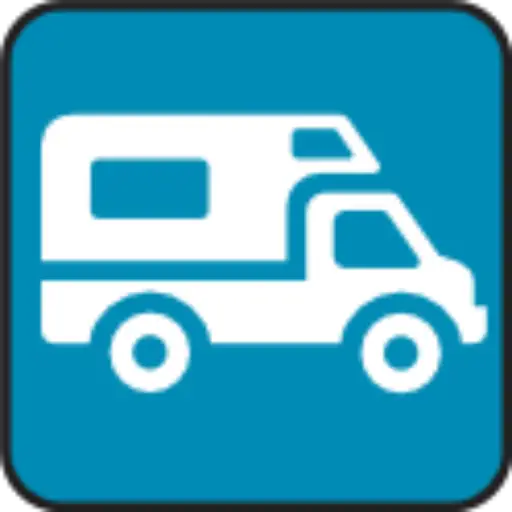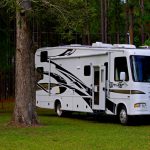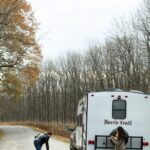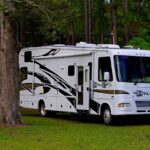
You’re ready to hit the road in an RV, but you’re a little nervous about driving something so big. Don’t worry, you’re not alone! We’ve all been there. Remember my first RV trip? I felt like I was driving a bus through a parking lot. 🙈 It was a hot mess. But, with the right RV and a bit of practice, driving can be a breeze. And that’s what this guide is all about. Get ready to discover the top 5 easiest RVs to drive for beginners, including tips for safe and confident RV driving.
Quick Answer
RVs vary greatly in size and maneuverability. For beginners, smaller RVs are generally easier to drive. Class B motorhomes (aka camper vans) are a popular choice due to their compact size and close-to-car driving experience. Class C motorhomes also offer a balance of space and ease of driving. But regardless of your choice, learning about your RV’s controls, practicing your driving skills, and driving defensively will help make the experience more enjoyable.
👉 Shop Class B RVs on: RVShare | Outdoorsy
👉 Shop Class C RVs on: RVShare | Outdoorsy
Table of Contents
- Quick Tips and Facts
- Choosing the Right RV for Beginners: A Guide to Easy Driving
- What are the different types of RVs?
- So… what is the easiest RV to drive?
- Top 5 Easiest RVs to Drive for Beginners
- Bonus: Tips for easy driving 🛣️
- Key takeaways
- FAQs ❔
- Stay up to date with news and offers! 📰
- Conclusion 🏁
- Recommended Links 🔗
- FAQ ❔
- Reference Links 📚
Quick Tips and Facts
- Know your dimensions: Make sure you know how big your RV is, including its length, height, and width, to ensure you can safely navigate tight spaces and avoid hitting anything.
- Practice makes perfect: Take the time to get practice driving your RV before you hit the road. Practice turning, backing up, and parking in an empty parking lot to get familiar with how it handles.
- Invest in a good RV driving course: A good course will teach you the basics of driving an RV, as well as how to maneuver in tight spaces and handle emergencies.
- Be aware of wind: RVs are more susceptible to wind than other vehicles, so be cautious when driving in windy conditions.
- Slow down on tight turns and when approaching intersections: Allow yourself plenty of time to navigate these areas and be alert for other vehicles.
- Check your mirrors often: Because of the size of your RV, you won’t be able to see everything in your rearview mirror, so it’s important to check your side mirrors often to make sure you’re aware of your surroundings.
- Use a spotter: If you’re driving in tight spaces, it’s always a good idea to have a spotter. A spotter can help you see blind spots and guide you into parking spaces.
Choosing the Right RV for Beginners: A Guide to Easy Driving
So, you’re thinking about taking the plunge into the wonderful world of RVing! That’s awesome! Before you start scrolling through online RV marketplaces, let’s talk about what truly makes an RV easy to drive, especially if you’re a newbie.
It’s not just about how many buttons it has, or the coolness factor of its features. The best RV for beginners is one that’s both manageable and enjoyable to drive. Let’s break down the key factors that will make your first RV adventure a smooth, and hopefully, stress-free one.
What to consider when choosing an RV for beginners:
- Size: Smaller RVs are often easier to maneuver and park. Don’t feel intimidated by smaller spaces; there are plenty of compact RVs with clever designs that make maximizing space a breeze.
- Weight: A heavier RV will be harder to stop and require a powerful tow vehicle.
- Turning radius: A large turning radius makes it challenging to negotiate sharp turns and crowded areas.
- Visibility: Make sure you have clear visibility out of the driver’s seat. Consider RVs with larger windows and mirrors.
- Fuel efficiency: RVs don’t get the best gas mileage, but smaller models are more fuel-efficient than bigger ones.
- Driving experience: Get familiar with the controls of your RV before you hit the road. Read the owner’s manual, take a test drive, and practice driving in an empty parking lot.
What are the different types of RVs?
There are several types of RVs out there – each with its own pros and cons. Understanding the differences can help you make an informed decision.
Here are some of the common types of RVs to know about:
| RV Type | Description |
|---|---|
| Class A Motorhomes | The largest and most luxurious type of RV. They typically have a spacious living area, a full-size bathroom, and a well-equipped kitchen. You drive them just like a car. |
| Class B Motorhomes (Camper Vans) | The smallest and most compact type of RV. They are easy to drive and park, and they are often very fuel-efficient. They are perfect for solo travelers or couples, however don’t expect much space. |
| Class C Motorhomes | A good compromise between the size of a Class A and the ease of driving of a Class B. Class C motorhomes often have a cabover bed, which can be a bonus for extra sleeping space. |
| Travel Trailers | The most affordable type of RV. You tow them behind a separate vehicle. They are also very versatile, come in different sizes, and are popular for their large living spaces. |
| Fifth Wheel RVs | Similar to travel trailers but with a fifth wheel hitch. They typically have a large living space and are popular for full-time RVers. |
| Toy Haulers | A hybrid type of RV that combines the livability of a traditional camper with a cargo area that can be used to haul toys like motorcycles, ATVs, and kayaks. |
So… what is the easiest RV to drive?
This is the big question, right? We won’t tell you definitively which type is the absolute easiest. The “best” RV will depend on your individual needs, driving style, and experience level. However, the Class B motorhome (also called a camper van) is often considered the easiest RV for beginners.
Why are Class B RVs easier to drive? 🚗
Here’s the deal: Class B motorhomes are like driving a big van. They are compact and maneuverable, making them a breeze to park, even in tight spaces. They also have a lower center of gravity which can make them feel more stable on the road, especially in windy conditions.
But remember, don’t let the “easy” label fool you! Always be respectful of the size and weight of your RV. Drive defensively, and keep a safe distance from other vehicles.
Top 5 Easiest RVs to Drive for Beginners
Based on what we hear from our community and our own experience, here are some popular RV models that are consistently praised for their ease of driving and beginner-friendliness:
1. Class C Motorhomes 🧒
- What we like: Class Cs offer a good blend of features for families. The cabover bed above the driver’s cab is usually popular with kids and gives extra sleeping space that can be accessed via a ladder.
- Brands to check out: Winnebago, Thor, Forest River
Check PRICE on:
- Winnebago Minnie 22M: RVShare | Outdoorsy | Winnebago Official Website
- Thor Axis 24.1: RVShare | Outdoorsy | Thor Official Website
- Forest River Sunseeker 24.1: RVShare | Outdoorsy | Forest River Official Website
2. Class B Motorhomes: The Versatile Van Life Option 🚐
- What we like: Class Bs are perfect for those who want a more compact and mobile experience. They’re easy to park in urban areas and even fit in some national park campgrounds.
- Brands to check out: Winnebago, Airstream, Mercedes-Benz
Check PRICE on:
- Winnebago Revel: RVShare | Outdoorsy | Winnebago Official Website
- Airstream Interstate: RVShare | Outdoorsy | Airstream Official Website
- Mercedes-Benz Sprinter 4×4: RVShare | Outdoorsy | Mercedes-Benz Official Website
3. Travel Trailers: The Classic RV Choice 🏕️
- What we like: Travel trailers offer a great balance of flexibility, affordability, and space.
- Brands to check out: Airstream, Jayco, Grand Design
Check PRICE on:
- Airstream Classic: RVShare | Outdoorsy | Airstream Official Website
- Jayco Jay Flight: RVShare | Outdoorsy | Jayco Official Website
- Grand Design Imagine: RVShare | Outdoorsy | Grand Design Official Website
4. Fifth Wheel RVs: Spacious and Comfortable 🏡
- What we like: Fifth Wheels give you a spacious living experience with a wider range of floorplans to choose from, often with multiple slide-outs.
- Brands to Check out: Grand Design, Keystone RV, Forest River
Check PRICE on:
- Grand Design Momentum: RVShare | Outdoorsy | Grand Design Official Website
- Keystone RV Montana: RVShare | Outdoorsy | Keystone RV Official Website
- Forest River Salem: RVShare | Outdoorsy | Forest River Official Website
5. Toy Haulers: Combining Adventure with Cargo 🏍️
- What we like: Toy haulers are perfect for adventure-seekers and those who like to bring their favorite toys along. They offer a cargo area in the back that can be used to haul ATVs, motorcycles, bikes, and more!
- Brands to check out: Forest River, Keystone RV, Jayco
Check PRICE on:
- Forest River Vengeance: RVShare | Outdoorsy | Forest River Official Website
- Keystone RV Raptor: RVShare | Outdoorsy | Keystone RV Official Website
- Jayco Octane: RVShare | Outdoorsy | Jayco Official Website
Bonus: Tips for easy driving 🛣️
- Practice parking and maneuvering in a large, empty parking lot: Practice turning, backing up, and parking.
- Get a spotter: If you’re driving in tight spaces, have a spotter help you see blind spots.
- Drive defensively: Be aware of other cars and drive slower than other vehicles.
- Familiarize yourself with the RV’s controls before heading out: Take time to learn the basic functions like lights, wipers, brakes, and turning signals.
- Stay alert in windy conditions: RVs are more affected by wind, so drive with caution.
- Know your turning radius: Be aware of the turning radius of your RV, especially in parking lots and intersections.
- Be cautious on hills and mountain passes: Be extra careful, and make sure your RV is properly loaded to maximize stability and braking power.
- Be aware of the weight distribution and load: Always make sure your RV is properly loaded to maintain balance and safety. Read your RV’s owner’s manual and make sure you are adhering to the manufacturer’s guidelines for weight distribution.
- Check for proper tire pressure and tread depth: Tire pressure can impact the handling of your RV, so always check it before heading out.
Key Takeaways
Here’s the bottom line: There’s no single “easiest” RV.
- Think about your needs: How much space do you need? Will you be traveling alone, with a partner, with a family or with a group of friends? How often will you be boondocking (camping off-grid)?
- Consider your budget: How much can you afford?
- Drive it before you buy it: Take a test drive of any RV you are considering before you buy it.
And remember, no matter which type of RV you choose, learning about it and practicing your driving skills will make the experience more enjoyable and less stressful.
FAQs ❔

What are the biggest differences between Class A, Class B, and Class C RVs?
Class A RVs are the largest and most luxurious, with a lot of living space. Class B RVs are the smallest and most compact, ideal for solo travel or couples. Class C RVs fall somewhere in between, offering a balance of space and maneuverability that makes them popular for families.
Do I need a special license to drive an RV?
Most RVs can be driven with a standard driver’s license. However, some states have restrictions on the size and weight of RVs that can be driven with a regular license. Check your state’s regulations to be sure.
What is the best way to practice driving an RV?
Find a large, empty parking lot, like a school parking lot, to practice turning, backing up, and parking. Then, you can start taking short trips on quiet roads before hitting the big highways.
Is it hard to drive an RV?
Driving an RV can be challenging at first, especially if you’re used to driving a car. However, it does get easier with practice. Take your time, be patient, and follow the tips above.
Where can I find more information about RV driving?
Many resources are available online and in libraries. Check out your local RV clubs and communities, and you can also find classes offered by dealerships and RV manufacturers.
What are some of the best places to go RVing?
There are countless amazing places to go RVing across the US and Canada. Some popular destinations include national parks, state parks, and RV resorts. You can find specific recommendations on popular RV websites and social media pages.
Stay up to date with news and offers! 📰
We are always adding new content and resources to our website, so be sure to check back often! You can also sign up for our email list to stay up-to-date on the latest RV news, tips, and deals.
👉 CHECK PRICE on:
Recommended Links 🔗
- RVShare: RVShare
- Outdoorsy: Outdoorsy
- Camping World: Camping World
- National Parks Service: National Parks Service
- Good Sam Club: Good Sam Club
FAQ ❔

How much does it cost to own and operate an RV?
The cost of owning and operating an RV varies significantly depending on the type of RV, its size, and its features. You’ll need to factor in the purchase price, insurance, registration, maintenance, and fuel costs.
What are some of the biggest challenges of RVing?
Some of the most common challenges of RVing include finding campsites, dealing with weather, and maintaining your RV. It’s important to do your research and be prepared for these challenges.
Where can I find resources to help me plan an RV trip?
Many resources are available online and in libraries. Check out RV parks and campsites, RV manufacturer websites, and online travel blogs. You can also get a lot of great information from other RVers through online communities and forums.
Reference Links 📚
- [RV Travel]: A Comprehensive Guide to Everything You Need to Know
https://www.rv.org/ - **[Camping World]: A Large Retailer of RVs, Parts, and Accessories. **
https://www.campingworld.com/ - **[RVshare]: A Peer-to-Peer RV Rental Platform] **
https://www.rvshare.com/ - **[Outdoorsy]: A Peer-to-Peer RV Rental Platform] **
https://www.outdoorsy.com/destinations/outdoorsy-bayfield
Conclusion 🏁

So, you’ve come to the end of our guide to the easiest RVs to drive for beginners. We hope we’ve shed some light on the different types of RVs available and helped you think about what might be the best fit for you. It all boils down to your individual preferences, needs, and comfort level.
Remember, practice makes perfect. Take the time to familiarize yourself with your RV’s controls, get practice driving in a safe environment, and always drive defensively.
If you are still unsure about which RV to choose, consider talking with an experienced RVer or RV dealer. They can offer valuable insights and recommendations based on your specific needs.
Our team at RV Brands™ is dedicated to helping you find the RV that is perfect for you. Let us know if you have any further questions!
Recommended Links 🔗
-
Class B Motorhomes:
- Winnebago Revel: RVShare | Outdoorsy | Winnebago Official Website
- Airstream Interstate: RVShare | Outdoorsy | Airstream Official Website
- Mercedes-Benz Sprinter 4×4: RVShare | Outdoorsy | Mercedes-Benz Official Website
-
Class C Motorhomes:
- Winnebago Minnie 22M: RVShare | Outdoorsy | Winnebago Official Website
- Thor Axis 24.1: RVShare | Outdoorsy | Thor Official Website
- Forest River Sunseeker 24.1: RVShare | Outdoorsy | Forest River Official Website
-
Travel Trailers:
- Airstream Classic: RVShare | Outdoorsy | Airstream Official Website
- Jayco Jay Flight: RVShare | Outdoorsy | Jayco Official Website
- Grand Design Imagine: RVShare | Outdoorsy | Grand Design Official Website
-
Fifth Wheel RVs:
- Grand Design Momentum: RVShare | Outdoorsy | Grand Design Official Website
- Keystone RV Montana: RVShare | Outdoorsy | Keystone RV Official Website
- Forest River Salem: RVShare | Outdoorsy | Forest River Official Website
-
Toy Haulers:
- Forest River Vengeance: RVShare | Outdoorsy | Forest River Official Website
- Keystone RV Raptor: RVShare | Outdoorsy | Keystone RV Official Website
- Jayco Octane: RVShare | Outdoorsy | Jayco Official Website
-
Books:
FAQ ❔
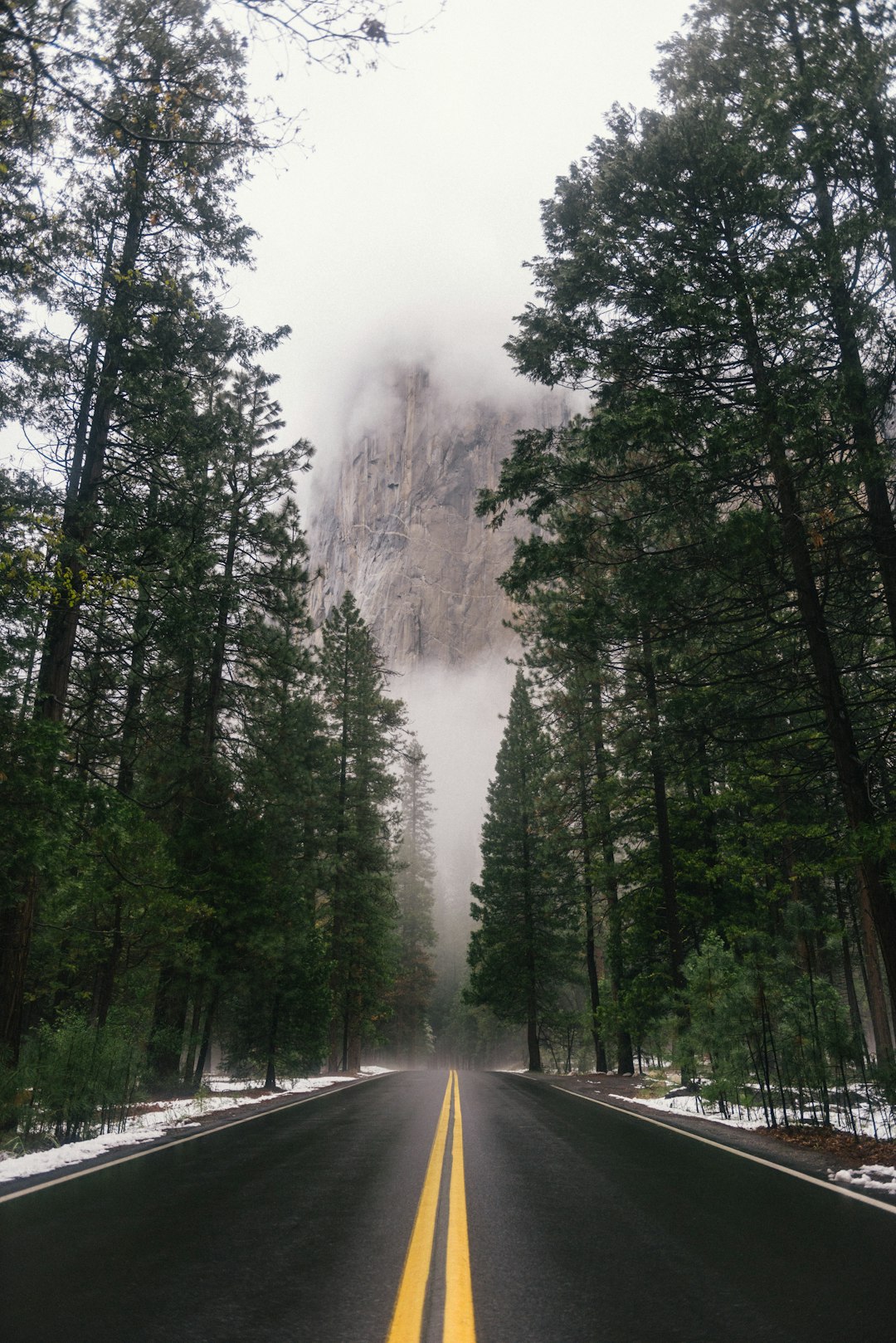
What type of RV is the easiest to drive?
Generally speaking, Class B motorhomes (camper vans) are often considered the easiest RVs to drive for beginners. Their compact size and maneuverability make them a breeze to park, even in tight spaces.
Why are Class B RVs easier to drive?
- Smaller Size and Turning Radius: They are much smaller than Class A or C RVs, making them easier to navigate tight turns.
- Lower Center of Gravity: This makes them feel more stable on the road, especially in windy conditions.
- More Similar to Driving a Car: Their handling is more similar to a van than a large truck, which can make them feel more comfortable to drive.
Is it easier to drive a Class B or C RV?
While both Class B and C RVs can be relatively easy to drive, Class B RVs typically win out in terms of ease of driving. They are smaller, more maneuverable, and often have a more car-like feel.
Why Class B RVs might be a better choice for beginners:
- Easier to Drive in Urban Areas: More comfortable for navigating cities with tight streets and parking spaces.
- Better Fuel Economy: They are generally more fuel-efficient than Class C RVs.
Read more about “The 5 Best RVs for First-Time Owners … 🚐”
How difficult is driving an RV?
Driving an RV can be a bit more challenging than driving a car, but it’s not impossible. It mainly comes down to getting comfortable with the size and handling of your RV.
Tips for making RV driving easier:
- Practice Parking and Maneuvering: A large empty parking lot is a great place to familiarize yourself with your RV’s dimensions and how it handles.
- Get a Spotter: Have someone help you see blind spots and guide you into parking spaces.
- Know the Controls: Familiarize yourself with the RV’s dashboard, mirrors, and controls.
- Drive Defensively: Be conscious of other vehicles, weather conditions, and your own driving limitations.
Read more about “12 Reasons Why RV Life is More Than Just a Vacation … 🚐”
What is the safest RV to drive?
It’s impossible to say definitively which type of RV is the absolute safest, as safety depends on many factors, including the driver’s abilities, the RV’s maintenance, and the driving conditions.
Things to consider for RV safety:
- Choose a well-maintained RV: Make sure it has functioning brakes, tires in good condition, and all safety features are in working order.
- Get Familiar with Your RV’s Specs: Know your RV’s weight, length, height, turning radius, and any other relevant information.
- Drive Defensively: Be conscious of other vehicles, weather conditions, and your own driving limitations.
We are always happy to provide recommendations based on your specific needs! Please don’t hesitate to reach out.
Reference Links 📚
- [RV Travel]: A Comprehensive Guide to Everything You Need to Know
https://www.rv.org/ - **[Camping World]: A Large Retailer of RVs, Parts, and Accessories. **
https://www.campingworld.com/ - **[RVshare]: A Peer-to-Peer RV Rental Platform] **
https://www.rvshare.com/ - **[Outdoorsy]: A Peer-to-Peer RV Rental Platform] **
https://www.outdoorsy.com/destinations/outdoorsy-bayfield - [Winnebago]: Manufacturer of Class A, B, and C Motorhomes
https://www.winnebago.com/ - [Airstream]: Manufacturer of Travel Trailers and Class B Motorhomes
https://www.airstream.com/ - [Mercedes-Benz]: Manufacturer of Vehicles, Including the Sprinter Van
https://www.mbusa.com/en/ - [Thor Motor Coach]: Manufacturer of Class A, B, and C Motorhomes
https://www.thormotorcoach.com/ - [Forest River]: Manufacturer of RVs, Including Travel Trailers, Fifth Wheels, and Toy Haulers
https://www.forestriver.com/ - [Keystone RV]: Manufacturer of Travel Trailers, Fifth Wheels, and Toy Haulers
https://www.keystonerv.com/ - [Grand Design RV]: Manufacturer of Travel Trailers, Fifth Wheels, and Toy Haulers
https://www.granddesignrv.com/ - [Jayco]: Manufacturer of Travel Trailers, Fifth Wheels, and Toy Haulers
https://www.jayco.com/ - **[What Type of RV Is the Easiest to Drive? – Jayco]:
